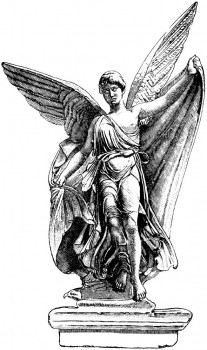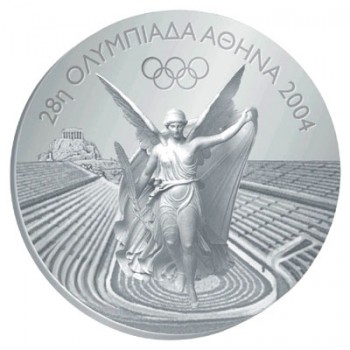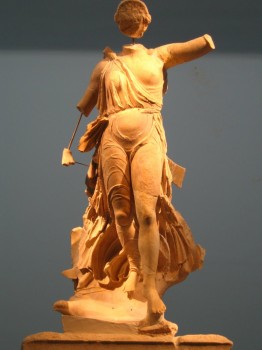Homo ludens, vita brevis
18 March 2011 | Letter from the Editors

Goddess of victory: charioteer and runner Nike (constructed from the damaged statue of Nike of Paionios, from ca. 420 BCE). Photo: Wikimedia
No one should ever start a piece with ‘already the ancient Greeks…’ , but here goes:
Already the ancient Greeks practised the noble arts of sport. The Romans extended the cultivation (their word!) of culture to leisure, amusing themselves by throwing Christians to the lions. Formula F1 came a couple of thousand years later, as did post-modern art, sitcoms and reality TV, whose presenters take the place of lions and whose celebrities are today’s Christians.
The Olympics, founded by the Greeks, were in full swing as early as the seventh century BCE, until the Christian Roman Caesar Theodocius I banned them as irretrievably pagan in the year 393. However, they were revived 1,500 years later.
In Europe, the various tribes organised themselves and began to form societies; the continent divided into nation states which, in addition to fields and sports, began to cultivate their own languages and, through them, science and art.
In his new non-fiction book, Urheilukirja (‘A book about sport’), novelist Tuomas Kyrö examines sport in Finland through history and his own experience. After an active early youth, Kyrö is now more of an armchair sportsman, but he seems pretty omnivorous in his tastes. According to him, sport is essential to the survival of nation states because of the constant competition for growth among nations. Of which, of course, the Olympics is the ultimate stage, or stadium.
![]()
In the Finnish nation state, sport and the arts are not merely juxtaposed but sometimes set against one another, certainly where state sponsorship is concerned. Fortunately, in addition to the niggardly hand of the government, the cultivation of matters of the spirit are funded via the lotto and the football pools, in other words directly from the generous (or greedy) hand of the people.
A new comparison has sparked debate in the Finnish media: the True Finns party, which is seeking power in April’s parliamentary elections – and, according to the polls, is likely to get it – has announced in its manifesto that ‘The fine paintings of Edelfelt and Gallen-Kallela and Sibelius’s world-famous symphonies are internationally recognised…. The True Finns feel that the preservation of the Finnish cultural heritage is of primary importance compared to supporting post-modern contemporary art. Government arts funding should be directed in such away that it strengthens Finnish identity. Faux-artistic post-modern experiments, on the other hand, should be left economically to individual sponsors and the free market.’
The party’s website also states: ‘Funding for excellence in world-class sport should be increased at the expense of the arts. It would, in the end, be a question of extremely small sums. To ensure the London (Olympics) project and one gold medal, all that would be needed would be around three million euros of extra funding for effective training…. For sport is the circus entertainment that interests the people more than the state-funded arts, which are also in a certain sense elitist…. Prowess in world-class sport and keep-fit for ordinary people always go hand in hand. Olympic sports have always played an important role in our national identity.’

The winner's game: since the 1928 Summer Olympics, the obverse face of the Olympic medals bear Nike's figure. Photo: Wikimedia
So three million is the price of one Olympic gold medal? Of course, there is no guarantee of one, even with this sum. Prowess in world-class sport and keep-fit absolutely do not ‘go hand in hand’. Democracy does not mean that everyone has to be interested in the same cultural matters. Quantity is no guarantee of quality; what ‘the people’ like cannot be more ‘right’ per se than what interests the ‘elite’. Feeding Christians to the lions is not admirable in human terms, however much the people liked it.
![]()
There’s much to mock in this new admiration of the cultural heroes of the turn of the 19th and 20th centuries. The ‘Finnish national’ artists Albert Edelfelt and Axel Gallén (later Akseli Gallen-Kallela) and the composer Jean Sibelius were also mondaine cosmopolitans seeking their training and a large part of their inspiration abroad (and their mother tongue was not Finnish, by the way, but Swedish).
Finnish identity and Finland’s national heritage were not born out of powers primordially ‘Finnish’. A return to an idealised past is not possible, not now, not ever. ‘National identity’ remains a notoriously debatable subject.

Ever onwards: Nike of Paionios (the Archaeological Museum of Olympia, Greece). Photo: Wikimedia
But aren’t sports and arts both such fun! Coming up on the Books from Finland site next are extracts from Tuomas Kyrö’s sports fan book, and in it, he also talks about the arts: ‘Competition, dance, theatre, rally-driving, literature, ball-games, individual sports, video installations. What they are is play. Immaterial and pointless activity. But, to their makers and participants, perfectly meaningful…. Completely pointless, and damned important.’
Tags: contemporary art, cultural history, Finnish society, sports
No comments for this entry yet
